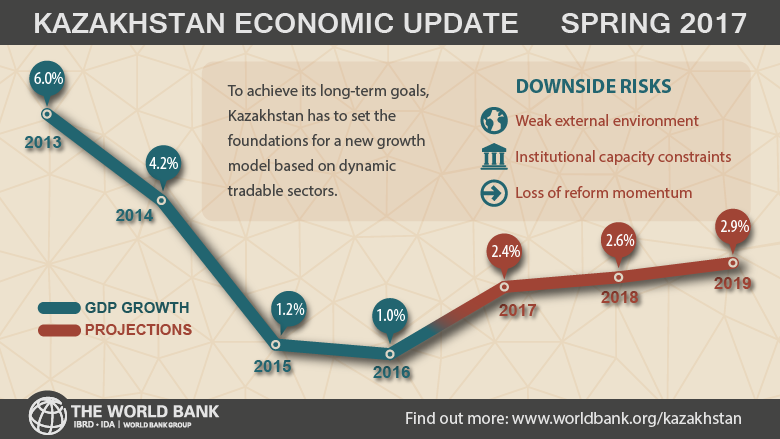ASTANA – The World Bank released a report which predicts Kazakhstan’s economic growth will pick up slowly in the medium term, but highlights it will remain much lower than before 2014. The report adds real GDP rates will be around 3 percent in 2017-2019.
 In the last year, the nation’s economy suffered from a slowdown in global oil prices, as the nation has low domestic demand. Real GDP growth declined from 1.2 percent in 2015 to 1 percent in 2016, according to the World Bank.
In the last year, the nation’s economy suffered from a slowdown in global oil prices, as the nation has low domestic demand. Real GDP growth declined from 1.2 percent in 2015 to 1 percent in 2016, according to the World Bank.
Lower oil prices and oil output widened the current account deficit, however investments in oil and gas production pushed up inflows of net foreign direct investment. As a result, the National Bank was able to partially replenish its international reserves, which it had drawn down earlier to finance foreign exchange interventions, according to the report.
Domestic consumption continued to slow down due to devaluation of the national currency. The inflation rate reached 14.6 percent, which in turn weakened household purchasing power.
The Kazakh government sought to stimulate domestic demand and diversify the economy in 2016. Authorities postponed fiscal consolidation and used economic support measures financed by the oil fund and additional borrowing. The government used special national programmes focused on increasing domestic demand through higher public wages and social transfers and continued subsidy provisions to national enterprises and small and medium-sized businesses. It also decided to support banking sector.
Authorities plan to recapitalise the country’s major banks. The National Bank started gradually easing its contractionary monetary policy as inflationary pressures subsided in the fourth quarter of 2016.
Experts predict oil prices will gradually recover and oil from the giant offshore Kashagan field will offset the observed declines in traditional oil output. As a result, export revenue will increase and positively impact Kazakhstan’s current account and fiscal balances. Yet, they emphasised even with the projected oil price level both balances will remain in deficit.
The report notes the agricultural sector is an important part of the country’s economy, which can help in its diversification and create more jobs. In his 2017 address to the nation, Kazakh President Nursultan Nazarbayev called agriculture “a new driver of the economy.”
Kazakhstan has great potential to increase rural incomes and create jobs, contributing to economic diversification and adding additional value to output through processing. Agricultural labour productivity is currently lower than in Russia and Belarus. At that, 15 percent of the state’s total arable land is unutilised, according to the report.
World Bank experts note Kazakhstan’s good location and consider it can help the nation enter the growing markets of China, India and the Middle East. This, along with the scale of agricultural resources, makes the country a potentially attractive investment for domestic and foreign investors.
Experts also highlight the risk-prone nature of agricultural business and advise using research, innovations and dissemination and adoption of new technologies. They note agricultural productivity significantly depends on infrastructure, as it declines significantly due to travel time. Public-private partnerships should encourage private investment in storage, distributional infrastructure and processing facilities.
